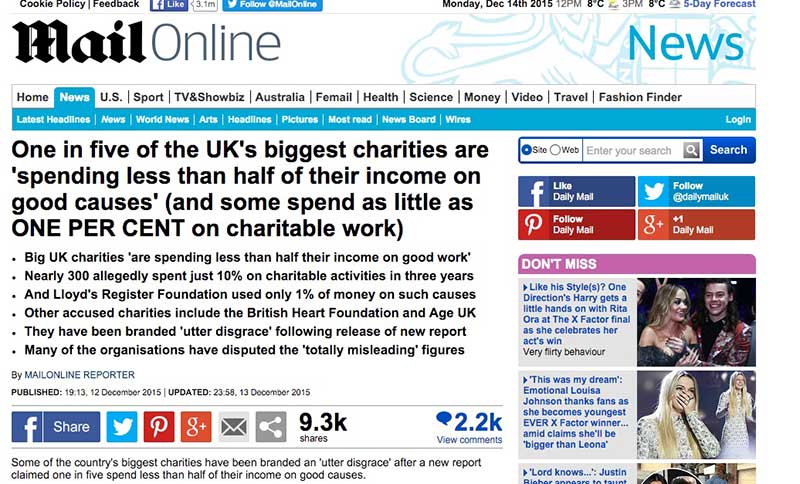Charities’ expenditure and costs are headline news again
A report that claimed many major charities were spending less than 50% of their income on charitable activities has been criticised as “misleading” by NCVO, major charities, Which? and The Charity Commission.
The True and Fair Foundation’s report was highlighted in The Daily Telegraph on 11 December. It was also reported by The Sun with the online headline Shocking figures claim one in five of the UK’s biggest charities ‘spend less than half of total income on good causes’.
The Daily Mail went further with the headline claim ‘One in five of the UK’s biggest charities are ‘spending less than half of their income on good causes’ (and some spend as little as ONE PER CENT on charitable work)‘.
Gina Miller of The True and Fair Foundation claimed:
“It is an utter disgrace that so much of the money people generously give is going to feed large charity machines, which are often characterised by obscene overheads and salaries, aggressive fundraising, and bloated marketing and publicity departments; resulting in questionable levels of charitable spending.”
The Metro (London) took a more balanced view in Worried about where your charity donations are going? Here’s what you need to know. It explored how charities report expenditure, especially when running a national network of shops is involved.
It featured responses from some of the charities criticised. For example, Guide Dogs argued that the report was “inaccurate and misleading”. It added:
Advertisement
“What the report has deemed non-charitable expenditure can be linked to trading, fundraising, sales of assets or building reserves, which generate additional income and help donations to go further.”
Martin Miles, Chief Financial Office of British Heart Foundation, added that he believed the report gave a “distorted view” of the charity’s finances. He said:
“It doesn’t allow for the very different financial profile of running the UK’s largest network of charity shops”.
NCVO’s Karl Wilding issued a prompt blog post criticising the findings and use of data.
In ‘True and Fair Foundation’ is neither true nor fair he explained how trading charities boost the value of donations, how unusual gifts such as a £50m endowment gift can skew one charity’s single year figures for expenditure, and what happens when a charity’s whole income is derived from trading.
He added that charities would fair badly if they took the report’s advice.
“So, to meet Ms Miller’s arbitrary ‘65%’ demands, Sue Ryder could shut down its charity shops. It would be spending less on trading, so its ratio would look ‘better’ in her eyes. But it would have millions of pounds less to spend on the people it helps”.
He also said that NCVO and some of the charities criticised tried to explain the figures to Ms Miller and The Daily Telegraph but that these offers and an offer to meet in person were not taken up.
Faced with these criticisms The True and Fair Foundation issued a response in which it reiterates the source of its figures and simply restates its interpretation of them. In it Gina Miller criticises NCVO as “no more than an industry lobbying group that seeks to defend the indefensible”.
The Foundation’s website features an image and quotation of Oscar Wilde:
“There is only one thing worse than being talked about, that’s not being talked about”.
Based on the time, money and effort being spent by charities to explain and rebut these allegations, the Foundation’s use of the quotation is apt.
The quotation of course is not precise: the word ‘and’ appears after the comma.
How to respond to such criticism?
Some sector staff took to Twitter to criticise the findings, or to contact some donors who publicly expressed their concern that the allegations might be true:
Would be nice to have a weekend without flawed analysis & coverage of charity issues. Journos need finance training https://t.co/IHRGnCHI8O
— Tania Cohen (@TaniaNC) December 12, 2015
Another flawed report on #charity admin ratios in the UK. https://t.co/zhlQswJ8FU
— David LockeAFCA (@DavidLockeAFCA) December 12, 2015
Good news! Based on @TrueAndFair2014 methodology Kids Company was an excellent charity – in 2013 it spent over 90% income on charity work!
— David Pearce (@medavep) December 12, 2015
David Lacey blogged on The IG Manager’s Blog that the sector was taking three approaches to dealing with this high profile criticism:
• discredit the analysis
• discredit the author personally and professionally
• explain why the numbers should be interpreted differently
He argues that none of these will sufficiently convince donors and that another approach is needed.
“Discredit the analysis and it looks as though you’re running away from the facts which the public can see for themselves. Attack Gena Miller personally and it gets you nowhere except possibly looking as though you’ve got something to hide. Coming back with ‘stronger’ charitable spend figures makes it look as though you’re fiddling the figures to get closer to that holy grail of 100% charitable spend”.
He argues, as have many others, that the charity sector has to stop competing with each other over percentages and to stop “pandering” to the notion that “spending money on anything but charitable activities = BAD”. Instead, he argues:
“What needs to happen now is for charities to decide what spend and investment they feel is appropriate for their own organisation, at this time, and communicate that with their donors and the wider public. But they MUST include a narrative – how did they reach those figures and why is it appropriate for them?”
Other articles on charities’ expenditure
In the light of the report and its criticism, JustGiving reminded its users that Kimberley Scharf, a professor of behavioural economics at The University of Warwick, had blogged on the site in July explaining charities’ fixed costs and how charities should explain them to supporters. She wrote:
“Explaining what fixed costs are, why they are necessary, and especially what difference they can make for charitable programmes could go a long way to offsetting donors’ negative perceptions”.
More criticism two days later
The criticism of some charities’ fundraising practices took another turn today with The Daily Mail alleging ‘predatory fundraising’ by fundraising agency ‘Wesser International’, while it was fundraising for St John Ambulance. The charity has suspended its work with the agency.
The article was illustrated with photos showing the agency’s managing director opening a bottle of champagne and smiling wearing a hat.
Wesser told The Daily Mail:
“We pride ourselves in being an honest and ethical company. We will be taking action to ensure this activity is eradicated, but we can assure you it is not in our policy or training manuals”.
The Sun featured the allegations on its front page today:








